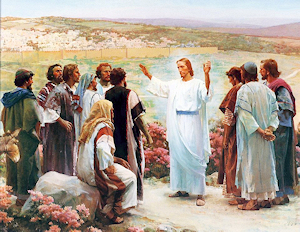A WEEK REMAINS FOR JESUS - AND HE KNOWS IT
Jesus
said to those Jews who believed in him,
"If
you remain in my word, you will truly be my disciples,
and
you will know the truth, and the truth will set you free."
They
answered him, "We are descendants of Abraham
and
have never been enslaved to anyone.
How
can you say, 'You will become free'?"
Jesus
answered them, "Amen, amen, I say to you,
everyone
who commits sin is a slave of sin.
A
slave does not remain in a household forever,
but
a son always remains.
So
if the Son frees you, then you will truly be free.
I
know that you are descendants of Abraham.
But
you are trying to kill me, because
my word has no room among you.
I
tell you what I have seen in the Father's presence;
then
do what you have heard from the Father."
They
answered and said to him, "Our father is Abraham."
Jesus
said to them, "If you were Abraham's children,
you
would be doing the works of Abraham.
But
now you are trying to kill me, a
man who has told you the truth that I heard from God; Abraham
did not do this.
You
are doing the works of your father!"
So
they said to him, "We were not born of fornication.
We
have one Father, God."
Jesus
said to them, "If God were your Father, you would love me, for
I came from God and am here; I
did not come on my own, but he sent me."
Jn 8:31-42
Meditation on the Liturgy

The debate between Jesus and those participating in the Feast of Tabernacles continues in today’s gospel reading, with the focus now on God’s truth and the breadth of its reach.
Jesus declares that those who hold fast to his word “will know the truth, and the truth will make you free.”
His listeners—some puzzled, some indignant—respond that, as they are the stock of Abraham, they “have never been in bondage to anyone.”
How is it, they demand, “that you say, ‘You will be made free’?”
The discussion deteriorates from there, with Jesus’s interlocutors mistakenly imagining that he is calling them bastard children. Yet, in their confusion and misapprehension, they bring us to the heart of the matter, proclaiming, “We have one Father, even God.”
To which Jesus responds that, in that case, they ought to esteem him, for “I proceeded and came forth from the Father; I came not of my own accord, but he sent me.”
The Son, the Light of the world, is teaching those in the Temple, and us, that salvation history has entered a new phase: while Israel remains in the truth that belongs by right to the descendants of Abraham (for God does not renege on his covenantal promises), the truth first revealed to Abraham is now being offered universally.
And in the Kingdom that is breaking into history in Jesus’s person and mission, abiding in covenantal truth will no longer be a matter of lineage but of faith—an act of faith that, in principle, is open to everyone, thanks to the grace of God offered to all by the Son of God.
The power of Trinitarian mercy and the truth about God’s relationship with his human creation cannot be confined, even if the distinctive role of Israel in witnessing to this truth will remain an essential part of salvation history.
Now, however, there will no longer be “Jew or Gentile…slave or free” [Galatians 3:28].
All who adhere to the Son, who reveals the truth about the Father, will be one.
This truth that Jesus offers is not something his disciples possess—as, for example, Peter, Andrew, James, and John “possess” certain “truths” about fishing on the Sea of Galilee.
On the contrary, the truth of God in Christ seizes and possesses the disciples, reshaping their lives, reordering their priorities, configuring those who embrace it in the imitation of the Son.
This is truth with power, and its power is evangelical: this is a truth that must be offered to others and lavishly expended in mission. For the paradox of the truth that Jesus offers is that his presence within us conforms us more closely to him, and its grasp upon us increases the more we give his truth to those who have not yet received it.
There is none of the prideful chatter we like to expend about zero-sum games in the economy of salvation, which is the expression in time of the ever-giving, ever-receiving truth, goodness and beauty of the Holy Trinity.
—George Weigel, Roman Pilgrimage: The Station Churches

Comments
Post a Comment